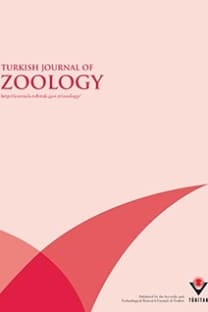Using body condition index can be an unreliable indicator of fitness: a case of sand lizard Lacerta agilis Linnaeus, 1758 (Sauria: Lacertidae)
Condition, corpulence, morphology, Lacertidae, sand lizard, Lacerta agilis, growth
Using body condition index can be an unreliable indicator of fitness: a case of sand lizard Lacerta agilis Linnaeus, 1758 (Sauria: Lacertidae)
Condition, corpulence, morphology, Lacertidae, sand lizard, Lacerta agilis, growth,
___
- Bancila RI, Hartel T, Plaiasu R, Smets J, Cogalniceanu D (2010).
- Comparing three body condition indices in amphibians: a case study of yellow-bellied toad Bombina variegata. Amphibia- Reptilia 31: 558–562. Bradshaw SD, De’ath G (1991). Variation in condition indexes due to climatic and seasonal factors in an Australian desert lizard,
- Amphibolurus-nuchalis. Aust J Zool 39: 373–385. 0 0 0 0
- ISSN: 1300-0179
- Yayın Aralığı: 6
- Yayıncı: TÜBİTAK
The genus Orthezia Bosc (Hemiptera: Ortheziidae) in Turkey, with 2 new records
Mehmet Bora KAYDAN, Zsuzsanna Konczné BENEDICTY, éva SZITA
Life history traits in Bufotes variabilis (Pallas, 1769) from 2 different altitudes in Turkey
Abdullah ALTUNIŞIK, Nurhayat ÖZDEMİR
Baradi WARYANI, Ghazala SIDDIQUI, Zarrien AYUB, Shaukat Hayat KHAN
New additions and invasive aphids for Turkey’s aphidofauna (Hemiptera: Aphidoidea)
Özhan ŞENOL, Hayal Akyildirim BEĞEN, Gazi GÖRÜR, Emin DEMİRTAŞ
Copidosoma boucheanum Ratzeburg (Hym.: Encyrtidae): new record from Iran
Hossein LOTFALIZADEH, Mehri BAB-MORAD
Orkun Barış KOVANCI, Bahattin KOVANCI
Mohamed NASSER, Azzam AL-AHMED, Mohammed SHOBRAK, Yousif ALDRYHIM
